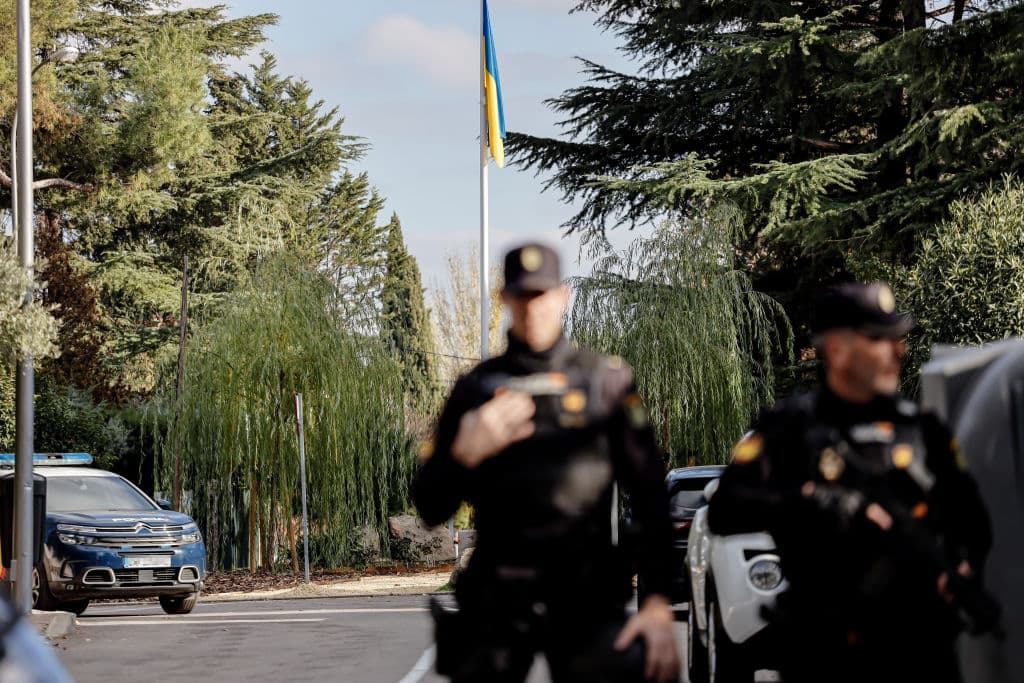Ukraine war latest: Multiple Ukrainian embassies receive blood-stained parcels with animal parts

Key developments on Dec. 2:
- Ukraine's military repels Russian advances near 14 settlements in eastern Donetsk, Luhansk regions.
- Russia has lost over 90,000 troops in Ukraine since Feb. 24, General Staff says.
- EU makes final decision to cap Russian seaborne oil prices at $60 a barrel.Ukraine's Embassy in Madrid also receives blood-stained parcel.
- Zelensky approves Security Council proposal on banning Moscow-backed church.
According to Foreign Minister Dmytro Kuleba, as many as 17 Ukrainian diplomatic missions abroad have received either letter bombs or blood-stained envelopes containing animal parts, such as cow and pig eyes, in recent days.
"This campaign is aimed at sowing fear and intimidating Ukrainian diplomats," Kuleba said in an interview with CNN.
"Everything started with the explosion in the Ukrainian Embassy in Spain. But what followed this explosion was more strange and, I would even say, sick," Kuleba said.
Multiple Ukrainian diplomatic missions reported they had received blood-stained parcels or were vandalized.
The latest incident was reported by Ukraine's ambassador to the Vatican, Andrii Yurash, who said on Dec. 2 that the entrance to his home in Rome was vandalized with what he believed to be animal feces.
"The door to the apartment and the stairs and walls in the entryway were smeared with a dirty substance with an unpleasant smell," he told the Associated Press news agency.
"It is hard to explain completely why and what is the reason of this terrible message, but it is no doubt a systematic trend, a systematic attack on Ukrainian missions around Europe," he said, referring to the blood-stained parcels that were earlier received by Ukrainian embassies in Spain, Hungary, the Netherlands, Poland, Croatia, Italy, and Austria, the consulates general in Naples and Krakow, and the consulate in Brno.
Oleh Nikolenko, Foreign Ministry spokesman, said on Dec. 2 that Ukraine has a reason to believe that "it is a well-planned campaign of terror and intimidation" of the country's embassies and consulates.
Kuleba told CNN that Russia was either directly responsible or that it was someone "who sympathizes (with) the Russian cause and tries to spread fear."
Kuleba has ordered an increase in security measures at all Ukrainian embassies and consulates as cases of threats are being investigated.
Previously, envelopes with explosive devices were sent to the Ukrainian and U.S. embassies in Madrid, Spanish Prime Minister Pedro Sanchez and Defense Minister Margarita Robles.
Similar packages were also delivered to the Torrejon de Ardoz air base in Madrid, which provides intelligence information to Ukraine's Armed Forces, and the headquarters of Spanish weapons manufacturer Instalaza, which produces rocket launchers supplied to Ukraine.
Defense Minister Oleksii Reznikov said on Dec. 1 he believes that Russia could be behind a series of recent letter bomb attacks in Spain.
"The world is beginning to recognize that (Russia) is a terrorist state. And terror knows no borders," Reznikov said.
Russia's losses in Ukraine
Ukraine's General Staff reported that Russia had lost 650 soldiers over the past day, bringing the total number of service members lost in its invasion of Ukraine since Feb. 24 to 90,090 military personnel, according to Ukraine.
Over the past day, Russian forces attacked near Stelmakhivka, Chervonopopivka, and Bilohorivka in Luhansk Oblast and Hryhorivka, Vyimka, Bakhmut, Opytne, Klishchyivka, Kurdiumivka, Pivnichne, Pervomaiske, Krasnohorivka, and Mariinka in Donetsk Oblast, the General Staff added.
No towns were lost.
The Institute for the Study of War (ISW) said in its latest report that Russia may be withdrawing its military personnel from positions closer to the front line in Zaporizhzhia Oblast to reduce the impact of increasing Ukrainian strikes on Russian manpower and equipment.
On Dec. 1, the Ukrainian General Staff said that Russian forces have withdrawn or are currently withdrawing personnel from Polohy, Myhailivka, and Inzhenerne in Zaporizhzhia Oblast.
The potential withdrawal from Polohy is "particularly notable," ISW, the U.S. think tank, says.
The settlement lies at a critical road junction, and Russian forces would likely have a harder time defending occupied Tokmak (a city 120 kilometers south of Zaporizhzhia) from a possible Ukrainian attack.
"The withdrawal from a critical position may suggest that Russian forces cannot defend the entire frontline in Zaporizhzhia Oblast and are prioritizing where to concentrate forces," the ISW found.
Ukraine aims to ban Moscow-backed church
President Volodymyr Zelensky signed a decree on Dec. 2 supporting the National Security and Defense Council's proposal to draft a law banning Russian-affiliated religious groups.
Zelensky's decree instructs the government to draft a bill on such a ban within two months.
The bill is expected to be considered by the Verkhovna Rada, Ukraine's parliament. At the same time, a list of Russian-linked clergy members subject to economic and other sanctions will be published later, said Zelensky.
The primary target of these measures is the Ukrainian Orthodox Church – Moscow Patriarchate (UOC-MP), an affiliate of the Russian Orthodox Church, which has been subject to multiple raids by the Security Service of Ukraine (SBU) since Nov. 23.
The SBU reported on Dec. 2 that it was conducting searches at churches and monasteries of the UOC-MP in Zhytomyr, Rivne, and Zakarpattia oblasts.
During previous raids, the SBU allegedly found Russian propaganda and xenophobic literature, Russian passports belonging to senior clergy, and documents with pro-Russian ideological messages at the premises of the UOC-MP.
In May, the Moscow-affiliated Ukrainian church said it would have "full independence" from the Russian Orthodox Church.
The Ukrainian branch also said that it "condemns the war" and "disagrees with the position of Patriarch Kirill of Moscow on the war in Ukraine."
However, skeptics said it was just a ploy to appease critics since the Ukrainian branch effectively remained part of the Russian church and did not declare "autocephaly" – the Orthodox term for genuine independence.
Despite the Moscow-backed church's public statements about the war, its agenda remains intertwined with the Kremlin's ideology, and they officially remain subordinated to the Russian church in the hierarchy of the Orthodox world.
Patriarch Kirill, the head of the Russian Orthodox Church, has been vocal in his support for Russia's war against Ukraine.
In September, he said that fighting against Ukraine "washes away sins."
As a result of Russia's full-scale invasion, more and more Orthodox parishes started switching from the Kremlin-backed church to the Orthodox Church of Ukraine.
EU sets cap for Russian seaborne oil at $60 a barrel
"The EU agreement on an oil price cap, coordinated with G7 and others, will reduce Russia's revenues significantly," European Commission President Ursula von der Leyen said on Dec. 2. "It will help us stabilize global energy prices, benefitting emerging economies around the world."
The decision envisages an adjustment mechanism to keep the cap at 5% below the market price.
The measure is also intended to limit Russia's ability to fund its aggression against Ukraine.
Also, an embargo on Russian seaborne oil approved by the EU in June will take effect on Dec. 5.
Since Russian seaborne oil will be banned for EU countries, the price cap is a measure intended mostly for non-EU countries. Insurers for the oil market, which are mostly based in Europe, will be banned from dealing with Russian oil priced above the cap.
The price cap will also strengthen the effect of the bloc's sanctions against Russia following its invasion of Ukraine, von der Leyen said.
"Together with our partners, we stand united and firm in our opposition to Russia's atrocious war," she added.
Earlier in November, EU diplomats discussed a price cap on Russian oil in the range of $65-70 per barrel.
On Nov. 28, Bloomberg reported, citing data provided by Argus Media Ltd., a publisher of commodity prices., that Russia's Urals crude oil fell to $51.96 a barrel at the Baltic Sea port of Primorsk — below the EU price cap.
Earlier the publication said Russia had already lost most of its oil market in the European Union's northern countries even before the EU embargo on Russian oil was set to take effect.
According to Bloomberg, Russian oil shipments to northern Europe have fallen below 100,000 barrels a day, compared to 1.2 million barrels a day sent to the region's ports each day in early February.









